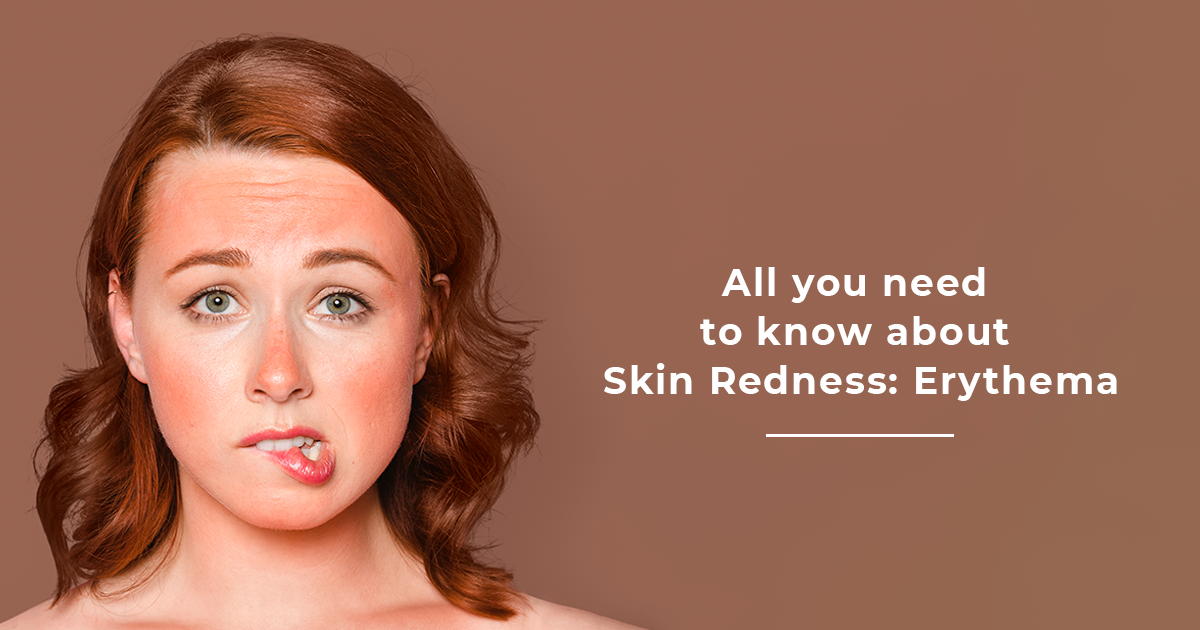All you need to know about skin redness: Erythema

Rosy cheeks with natural blush are always loved by everyone! But, excessive skin redness is a sign of skin problems that need closer attention. When we talk about skin redness, the first thing which crops up in our mind is skin allergy or a simple rash. However, skin redness has more to it! Let us find out more about the causes, symptoms, and solutions to skin redness.
What is skin redness?
Skin redness is clinically termed “Erythema.” Ask your dermatologist or beauty expert and they will immediately help you diagnose it. Skin redness is not always a major concern, but it can cause discomfort when associated with other skin symptoms.
It is important to find out the cause of skin redness. Eliminating the cause can help treat the problem of erythema from the root cause. Let us check out the causes of skin redness in the next part of the article.
Causes of Skin Redness
The causes of skin redness are as follows-
- Sunburn or photodermatitis or heat rash
- Atopic or contact dermatitis due to friction
- Allergy due to long-term medications
- Hot flushes or hormonal upsurge
- Hives or urticaria which may be seasonal
- Skin problems like acne rosacea
- Bacterial or fungal infections
- Post-inflammatory conditions like acne spots
- Autoimmune disorders such as psoriasis or eczema
- Using harsh chemicals present in facial cleansers
- Exfoliating or rubbing skin vigorously
- Damaged skin barrier due to excessive dryness
- Skin treatments involving chemical peels
- Excessive sweating after a workout
- Certain foods such as spices
- Poor quality of makeup with harsh chemicals
How does erythema occur?
When your skin is irritated due to any of the internal or external factors, it becomes inflamed. A lot of inflammatory mediators are released from the body leading to inflammation. This inflammation shows up as skin redness. There may be an internal cause linked with erythema when the skin immunity is affected.
Erythema or skin redness may further become complicated when neglected causing damage to the skin barrier. The main function of the skin is protection. Damage to the protective layer of the skin (skin barrier) may compromise the skin's immunity resulting in a host of skin issues like acne, sunburn, eczema, dermatitis, infections, and a lot more!!! Remember, tender sensitive skin is more prone to damage.
In such cases, it is important to initiate the healing process to allow the skin to recover and prevent further damage.
Symptoms of Erythema
The main symptoms of erythema are as follows-
- Excessive redness of the skin
- Burning sensation on the skin
- Flushing of skin
- Ruptured blood vessels visible on the skin
- Hyperpigmentation of the skin
- Raised facial bumps
- Excessive warm skin
- Tender inflamed skin
- Itching of skin
- Damaged skin barrier
- Increased skin sensitivity
- Skin peeling
- Skin dryness
What should I do to help heal skin redness?
It is advisable to handle skin with gentle care for the healing process to occur. Inflammation and skin redness may stay active for 5-6 days in acute cases. However, in chronic cases, the skin redness may last for around months.
It is recommended to stimulate the healing process to allow the damaged skin barrier to recovering naturally. The healing process is quite complex and consists of two steps namely-
- Tissue formation
- Skin matrix remodeling
It is important to control the intensity of inflammation and redness of the skin which helps in the further spread or damage of the skin barrier. Remember, inflamed skin is very delicate and thin in texture. You may even end up damaging the blood vessels thus making erythema worse.
Slight hyperpigmentation or minimal skin discoloration may occur post-healing which can be taken care of once the redness settles. Allow the skin to heal. Nature and time are very important to allow the healing process in the correct manner. If your skin does not heal in the correct manner, it may result in loss of collagen damaging the skin barrier.
Best solutions for skin redness
Here are quick and easy solutions to prevent skin redness
- Aloe vera gel
- Honey
- Kaolin clay mask
- Vitamin C Serum
- Vitamin E Moisturizer
- Squalene-enriched moisturizer
- Antioxidant-rich toner
- Soothing cucumber extract enriched toner
- Turmeric and milk mask
- A few drops of natural oils like coconut or almond
Controlling skin redness to prevent flare-ups is the best solution. Opt for natural skin tonic to control the redness of the skin by stimulating the skin's healing power.
If your skin is prone to inflammation or redness, it is advisable to switch over to natural skin care products. Choose paraben-free and cruelty-free skincare for beautiful healthy skin.